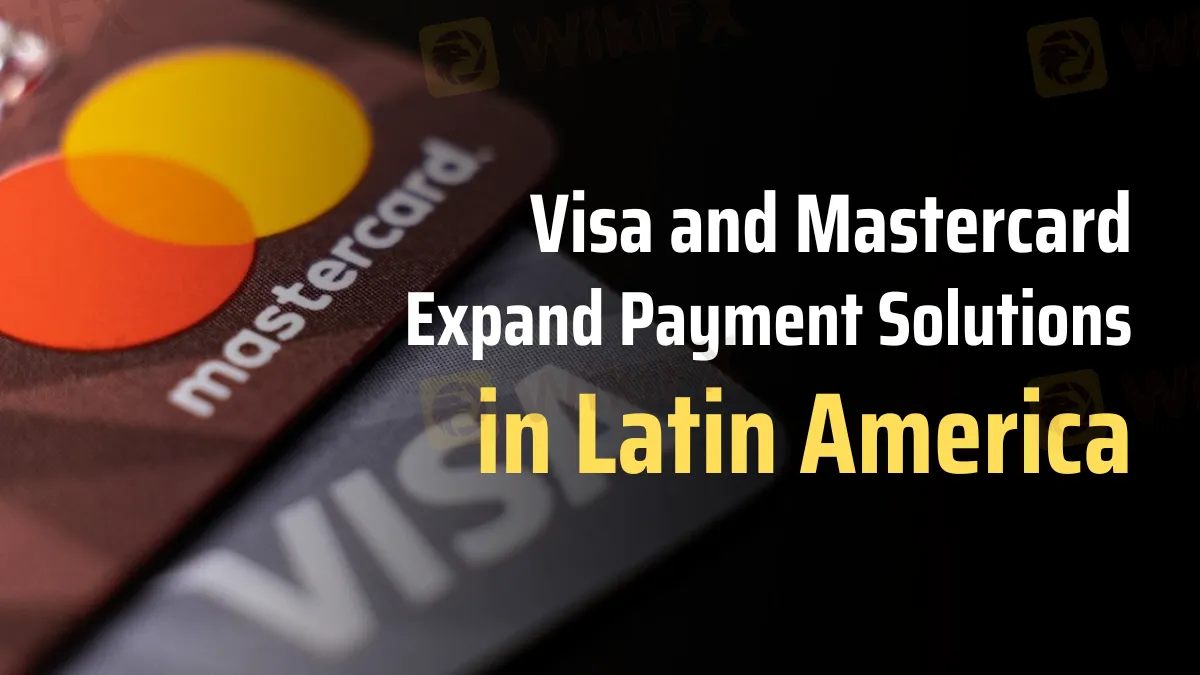简体中文
繁體中文
English
Pусский
日本語
ภาษาไทย
Tiếng Việt
Bahasa Indonesia
Español
हिन्दी
Filippiiniläinen
Français
Deutsch
Português
Türkçe
한국어
العربية
Visa and Mastercard Expand Payment Solutions in Latin America
Abstract:Visa Direct launches in Colombia, and Mastercard's Biometric Checkout Program debuts in Uruguay, transforming the payment landscape.

Through significant growth in Uruguay and Colombia, Visa and Mastercard are pushing the envelope of payment technology in Latin America. Through these programs, the region's financial inclusion and payment experiences are to be increased.
Growing Visa Direct in Colombia
With the help of its collaboration with Canadian finance startup Nuvei, Visa is making great progress in Colombia. Since Visa Direct was introduced in Colombia, retailers may now use card credentials to provide quick payments straight to their customers' bank accounts. Payments in a variety of businesses will be secure and simple thanks to this service's promised almost real-time transaction processing.
Visa Direct now enables Nuvei businesses in Colombia to provide bill payments, cross-border transfers, and person-to-person (P2P) payments. Being the first international payments provider to provide direct local acquisition in Colombia, Nuvei is now positioned as a leader in the payments industry, in addition to streamlining payment procedures.
Without the need for additional middlemen, retailers can incorporate Visa Direct thanks to Nuvei's modular payments technology platform. For Colombian enterprises, this integration gives them instant access to more than 30 nations in Europe, North America, and portions of Asia.

Uruguayan Mastercard Biometric Checkout
Mastercard, meanwhile, is debuting its ground-breaking Biometric Checkout Program in Uruguay, which enables customers to pay with only their palms. Piloting of this novel payment mechanism is being done in collaboration with Scanntech, Fujitsu Frontech, Fulcrum Biometrics, and Ingenico.
A big step forward in payment technology, the Biometric Checkout Program provides quicker transactions and shorter lineups at the register. Consumers may register their payment credentials and biometric information on-site. They only have to wave their palm over a sensor at the payment terminal to finish a transaction after they are enrolled.
Together with improving payment speed and ease, this program also offers a customized and efficient purchasing experience by integrating with reward programs. With its ability to do away with wallets and other devices, the technology created by Ingenico and Fulcrum Biometrics raises the bar for in-store payments.
More General Effects
The growths of Visa and Mastercard both highlight a larger tendency in Latin America toward creative payment options. With these developments, financial inclusion is expected to increase and both consumers and companies will have safe, effective, and easily available payment alternatives. The area is about to see a payment revolution as Visa Direct makes rapid payments possible in Colombia and Mastercard's Biometric Checkout revolutionizes the shopping experience in Uruguay.
By means of these programs, Visa and Mastercard are not only improving the payment infrastructure in Latin America but also opening the door for the next developments in the international payment system.
You may access the latest news in the financial market here.

Disclaimer:
The views in this article only represent the author's personal views, and do not constitute investment advice on this platform. This platform does not guarantee the accuracy, completeness and timeliness of the information in the article, and will not be liable for any loss caused by the use of or reliance on the information in the article.
Read more

Thinking of Investing? Read Must-Know Facts About Funding pips!
When you check the internet for Funding Pips, you'd be surprised to know it's filled with praise for Funding Pips but often lacks the real facts that traders need. Everything that seems too good to be true should always be verified first. It could be Fraud . So, we conducted research and collected several facts you must know about Funding Pips.

OctaFX Back in News: ED Attaches Assets Worth INR 134 Cr in Forex Scam Case
The Enforcement Directorate (ED) in Mumbai has attached assets worth around INR 131.45 crore. This included a luxury yacht and residential properties in Spain. Read this interesting story.

Oil Prices Stay Firm on Solid US Jobs Data
Oil prices stayed firm this week as the US labour department posted a better-than-expected payroll data in June 2025. Read this news in detail.

Truth About Angel One – Here’s What You Need to Know
Thinking about investing in Angel One? Wait! Know the essential things about the broker before Invest. It could be SCAM. Read, think, and invest .
WikiFX Broker
Latest News
Tokenized Stocks: Innovation or Just Another Wrapper?
Gold Rush Again: What's Driving the Bullion Market Crazy Ahead of US Jobs Data?
XTB Launches Tax-Advantaged Retirement Accounts in Poland
Zaffex Broker Review
ECB Ends Easing Cycle, But The Eurozone Crisis Is Just Beginning
Amazon deploys its 1 millionth robot in a sign of more job automation
MT4 and MT5 Platforms - Helping Traders Up Their Forex Trading Game
A bare-bones deal is Europe's best hope in trade talks with the U.S., sources say
10-year Treasury yield remains higher despite weak ADP jobs report
Blueberry Markets Revamps its Website
Currency Calculator


